► Choice of two petrol and one diesel engine
► Rear-wheel drive platform shared with Kia Stinger
► Driven in the UK with both engine types
If you’ve been paying attention over the last few months, you’ll know there’s a new kid on the premium car block. With a big saloon and SUV already available, the Genesis G70 is the third offering from Korea’s answer to the established European players. A Shooting Brake is on the way for you sensible sorts, with the saloon you’re looking at here the opening gambit.
But what’s the G70 aiming at? Well, with the G80 a 5-series rival, the smaller G70 is a direct competitor for the BMW 3-series. If you’re trying to get your head around the naming convention, the (very good) GV70 SUV rivals the X3 while the GV80 goes toe to toe with the X5.
So, there’s plenty of engine choice?
Err, no. Despite the plug-in hybrid being an ever more popular choice in the compact executive class and mild hybridisation becoming the norm for petrol and diesel models, the G70 has just two regular engines. There’s a 197bhp 2.2-litre diesel for those that are looking to buck current trends and a 2.0-litre petrol in two power outputs.

At the bottom of the range is a 194bhp unit that’s relatively sluggish, while there’s also a 242bhp version that’s far brisker on paper. None of the units have particularly impressive CO2 or economy figures, making this a tough sell to company car users. A 3.3-litre twin-turbo V6 is available in other markets, but not in the UK currently.
The G70 is rear-drive only and shares a platform with the rather entertaining Kia Stinger. Furthermore, Sport Line models like the red one pictured get a few trinkets to help you make the most of its layout. Ignoring the usual styling guff, there’s adaptive dampers with switchable modes taking you from squishy to stiff, beefy four-pot Brembo brakes up front, a sports exhaust, stickier tyres and a mechanical limited-slip diff. Coupled with bespoke tuning for European tastes, the end result is really rather impressive.
So, what’s it like on the road?
Even without going for the Sport Line spec, the G70 is a deft handler indeed. In Comfort mode there’s a pleasant waft to proceedings and enough give in the sidewalls to avoid feeling lead-footed over crumbling road surfaces. Larger crests and compressions taken at speed reveal a slightly loose edge to proceedings, but on the whole it’s a more cushioned experience than an adaptively sprung 3-series. The only hiccup with rolling refinement is quite a lot of tyre noise – not something truly befitting a compact executive car.
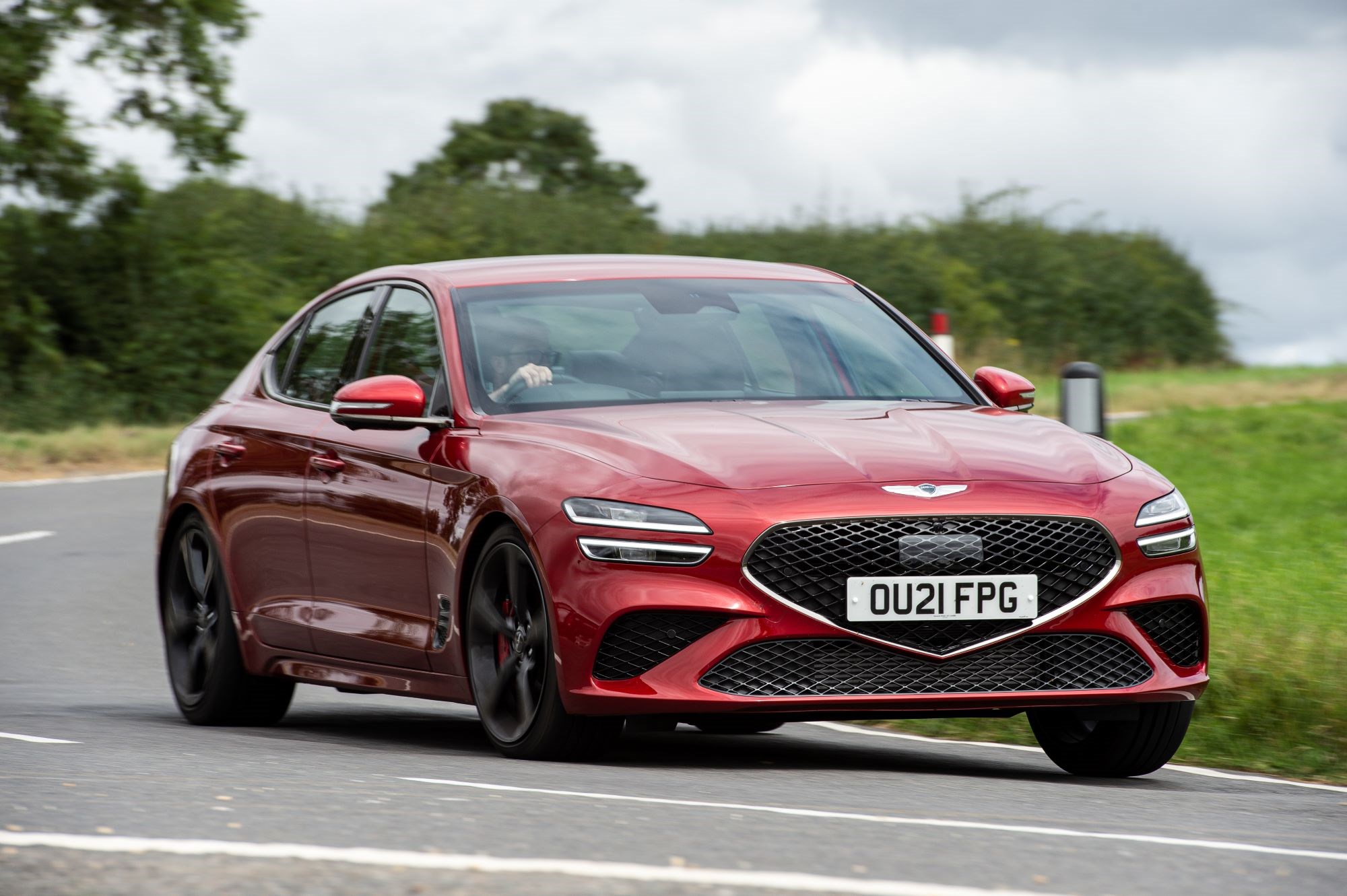
Flick the G70 into Sport and any unwanted float is eliminated, giving a firm edge that’s definitely a bit much for general schlepping, but works well over challenging B roads if you don’t mind being jostled around a little. Big impacts don’t deflect you from your chosen trajectory, body roll is kept well in check and the nose resists washing wide well. The front end is tight and alert on all models, giving you at least the impression the G70 is light on its toes.
The presence of the diff on Sport Line models means you can coax the tail into steering the car if you slacken the electronic safety nets, too. However, even with 242bhp to call upon, you’ll just feel a slight tightening of your line in all but the slowest of bends. More importantly for the day to day, the steering is well weighted, precise and even delivers a modicum of connection to the road’s surface.
Where’s the rub?
It’s a shame the engines aren’t livelier. Although it’ll do 0-62mph in 6.1sec according to the official figures, the petrol engine just doesn’t feel all that quick on the road despite a fast-acting eight-speed automatic gearbox. That’s no surprise as it’s heavier and considerably less torquey than the equivalent BMW 330i.
Even with the sports exhaust it sounds a bit flat – not that the 330i is a particularly sonorous thing – so you might actually prefer flicking the ‘sound enhancer’ on to pretend you’ve got more than four cylinders under the bonnet.
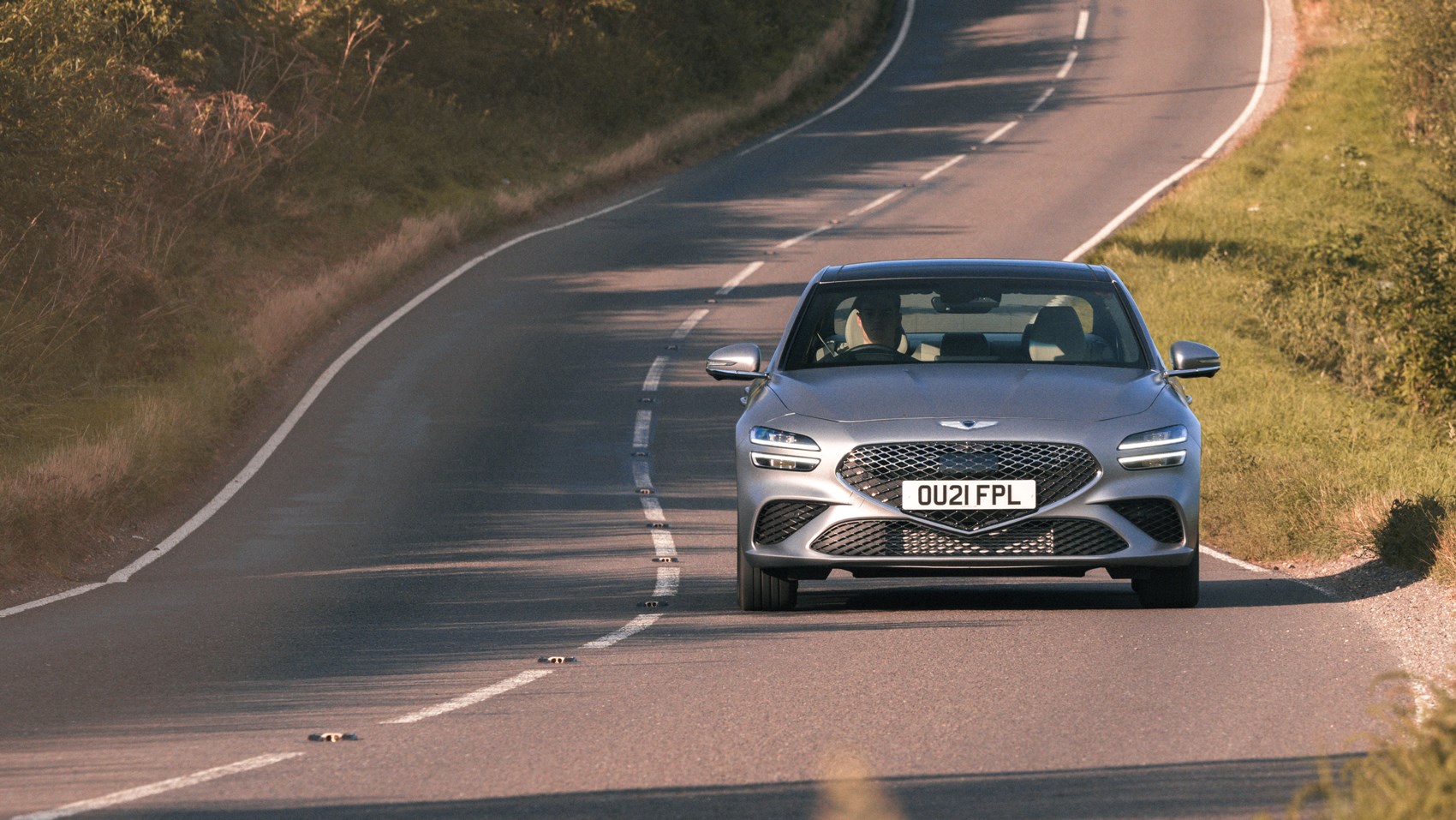
The diesel is also a bit middling, too. It’s thankfully not as clattery as Merc’s C-Class diesel, but not quite as refined and reserved as the derv units you’ll find in a 320d or A4 35 TDI, with a satisfying wave of torque in the mid-range to take advantage of. It’s definitely not an athletic engine – few diesels are – but behaves amicably, if not impressively.
These are fairly minor woes compared to the real kicker: efficiency. No G70, not even the diesel, dips below the 37% BIK tax bracket making them a hard sell to company car users. Then there’s the economy; on a long and gentle motorway run we saw a best of 34mpg with the petrol, and around 40mpg with the diesel.

Throw in some heavier acceleration plus a bit of town driving and you’ll see that dip to nearer 28mpg for the petrol, with a spirited run cross country putting it into the teens. To put things into perspective, that’s sub-330i performance with real-world economy figures easily beaten by the far faster and four-wheel drive M340i. Ouch.
Will the interior win me over?
Apart from a few chintzy chrome plastic bezels, the interior is a nicely put together place with a good spread of suitably premium materials and switches that work with well-damped precision. The 10.25in touchscreen infotainment system is sharp and responsive, albeit a lightly refaced version of what you’d find in a modern Hyundai or Kia.
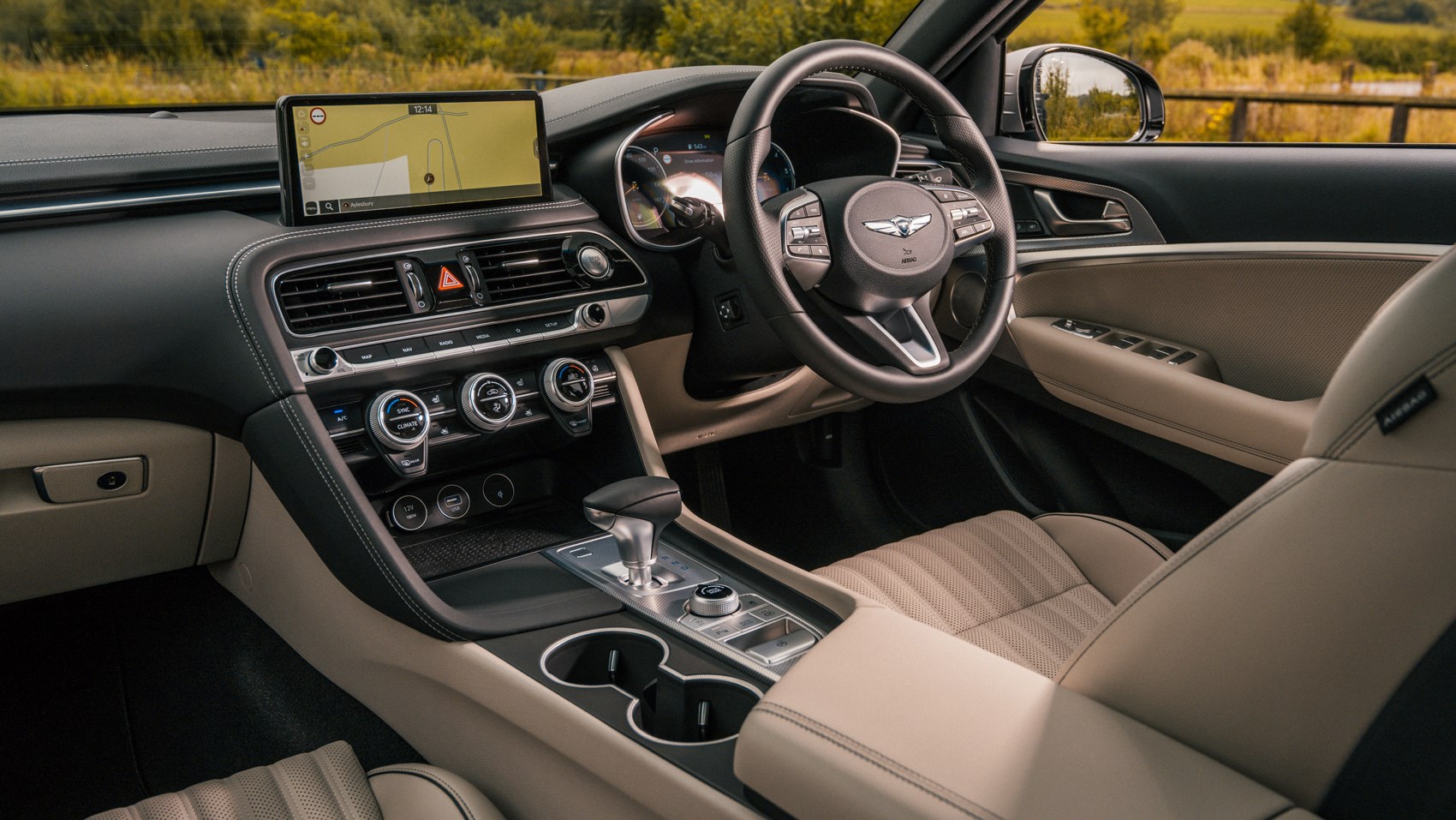
The 12.3in digital dials are available with 3D-effect graphics that look good and don’t make your eyes go slightly squiffy like those found in Peugeots. The dials change depending on driving mode and the centre section can show a variety of information, yet you’ll find Audi and Mercedes’ equivalents have far more customisation options.
Even so, the G70’s interior ambience feels… old, like it’s a last-generation car from the driver’s seat. It’s a pretty light complaint in reality, though – everything’s really well built, neatly laid out and there’s plenty of technology. But compare the interior design to that of the show-stopping cockpit of the GV70 and you’d think the two cars were built several years apart.
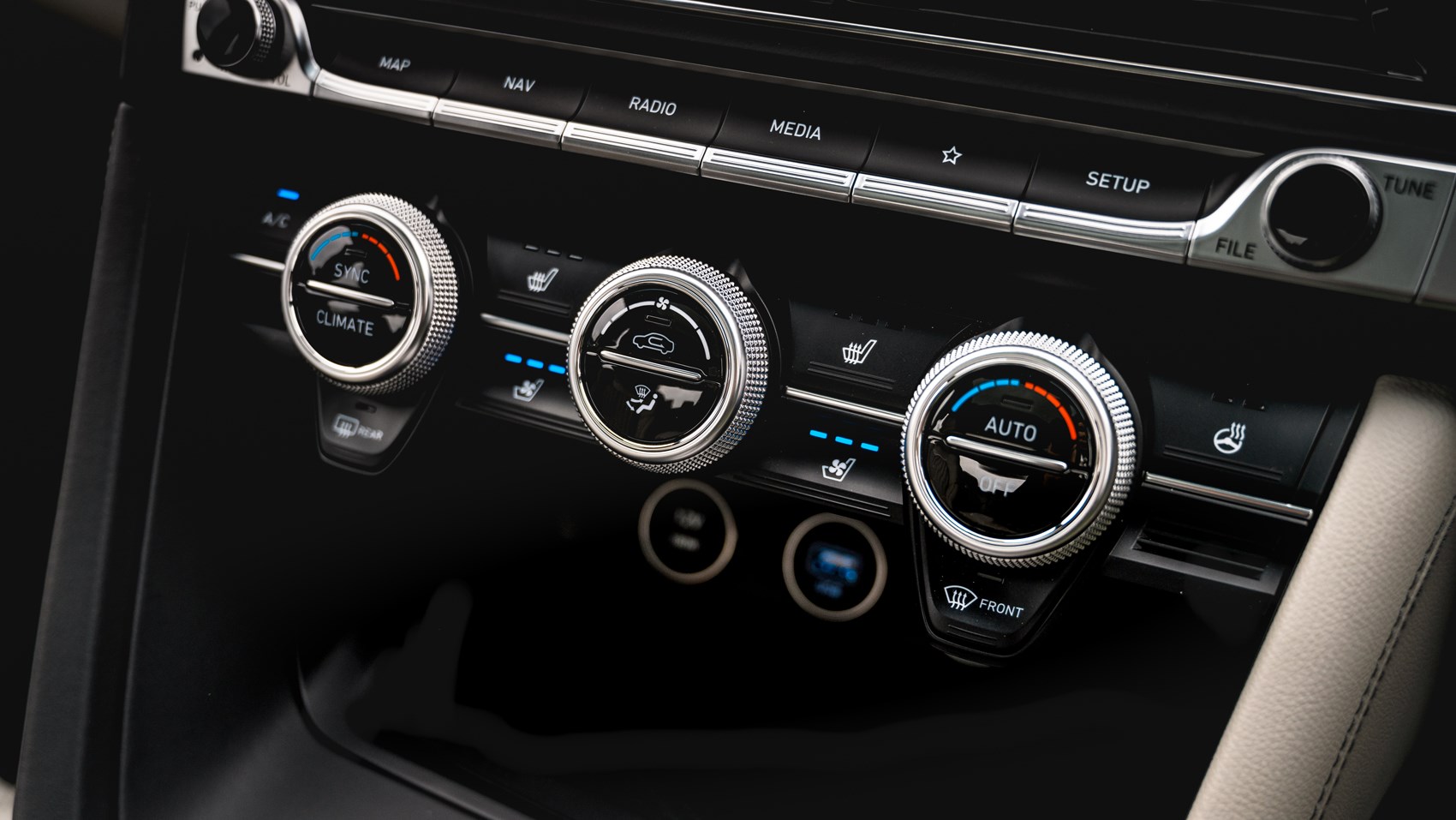
Front space is okay, and there are plenty of areas to empty your pockets into, but we’d recomment avoiding specifying the sunroof if you’re a tall driver. The seat’s adjustment doesn’t go low enough for the tallest among us, so 6ft 2in deputy news editor, Jake, had to recline the seat back so as to not scuff his head on the ceiling.
That then affected space in the rear. It’s already acceptable at best for the class but, if you’re sat behind a tall driver, legroom for a rear passenger behind them is cut town to a few centimetres. Not enough for anyone beyond a child in a booster seat. The boot is also a bit disappointing with less space than key rivals and even a Volkswagen Golf. It’s long and wide enough, with depth being the real issue here.
Genesis G70: verdict
Let’s start with the good. The G70 is certainly a great handling compact exec, with a good blend of comfort and cornering ability depending on what setting (or feeling) you’re in. Tactile steering and a smooth, obedient automatic gearbox help make this something you can really enjoy driving.
At least, it is if you can ignore what lurks under the bonnet. Like the G80 we tested previously, the G70’s engines lack the punch and parsimony required in this class, while the lack of any hybrid offering is something of an oversight.
With interior space being on the tight side and pricing that’s competitive but in no way a bargain, you’d have to really fall for the looks or the promise of a stress-free ownership experience. For some that might be enough, but we want a little more.
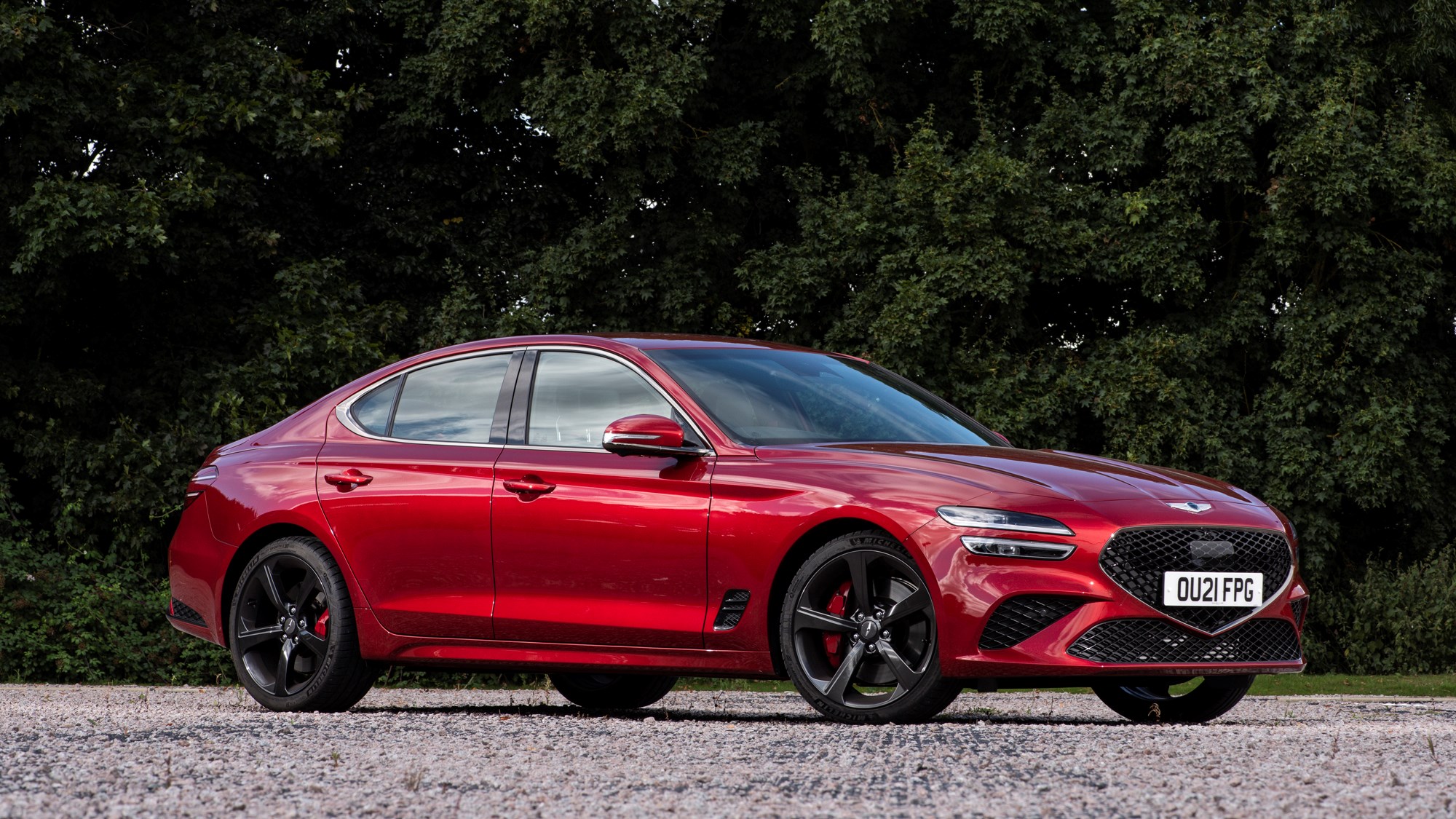
Read more Genesis reviews here